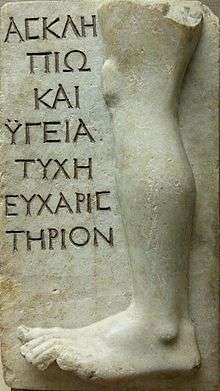calf
English
Pronunciation
Etymology 1

A cow and calf
From Middle English calf, kælf, kelf, from Old English cælf, ċealf, from Proto-Germanic *kalbaz, further etymology unknown[1].
Noun
calf (plural calves)
- A young cow or bull.
- Leather made of the skin of the calf; especially, a fine, light-coloured leather used in bookbinding.
- A young elephant, seal or whale (also used of some other animals).
- A chunk of ice broken from a larger glacier, ice shelf, or iceberg.
- (Can we find and add a quotation of Kane to this entry?)
- A small island, near a larger island.
- the Calf of Man
- A cabless railroad engine.
- (informal, dated) An awkward or silly boy or young man; any silly person; a dolt.
- Drayton
- some silly, doting, brainless calf
- Drayton
Synonyms
Derived terms
- bull calf, bull-calf
- calfskin
- cow calf, cow-calf
- heifer calf
- kill the fatted calf
- mooncalf
- reindeer calf
Related terms
Translations
young cow or bull
|
|
young elephant, seal or whale (also used of some other animals)
|
|
chunk of ice broken off of a larger glacier, ice shelf, or iceberg
- The translations below need to be checked and inserted above into the appropriate translation tables, removing any numbers. Numbers do not necessarily match those in definitions. See instructions at Wiktionary:Entry layout#Translations.
Etymology 2

Calf of the leg
From Middle English calf, kalf, from Old Norse kalfi, possibly derived from the same Germanic root as English calf (“young cow”) (above). Cognate with Icelandic kálfi (“calf of the leg”).
Noun
calf (plural calves)
- (anatomy) The back of the leg below the knee.
- The muscle in the back of the leg below the knee.
- 1988, Steve Holman, "Christian Conquers Columbus", Ironman, 47 (6): 28-34.
- Sure, his calves are a little weak, but the rest of his physique is so overwhelming, he should place high.
- 1988, Steve Holman, "Christian Conquers Columbus", Ironman, 47 (6): 28-34.
Translations
anatomy: back of the leg below the knee
|
|
muscle in the back of the leg below the knee
- The translations below need to be checked and inserted above into the appropriate translation tables, removing any numbers. Numbers do not necessarily match those in definitions. See instructions at Wiktionary:Entry layout#Translations.
References
- Kroonen, Guus (2013), “*kalbiz-”, in Etymological Dictionary of Proto-Germanic (Leiden Indo-European Etymological Dictionary Series; 11), Leiden, Boston: Brill, page 278
Middle Dutch
Etymology
From Old Dutch calf, from Proto-Germanic *kalbaz.
Inflection
This noun needs an inflection-table template.
Middle English
Etymology 1
From Old English cælf, Anglian form of ċealf, from Proto-Germanic *kalbaz.
Pronunciation
- IPA(key): /kalf/, /tʃalf/
Noun
calf (plural calver(e) or calveren or calves)
- A young cow; a bovine that has not fully matured.
- A representation of a calf; something that looks like a calf.
- A deer which hasn't fully grown.
- (rare, biblical) The calf in Revelation around the throne of God.
- a. 1382, John Wycliffe, “Apocalips 4:7”, in Wycliffe's Bible:
- And the firſte beeſte lijk a lyoun; and the ſecounde beeſte lijk a calf; and the thridde beeſte hauynge a face as of a man; and the fourthe beeſte lijk an egle fleynge.
- And the first beast [was] like a lion; and the second beast [was] like a calf; and the third beast had a face like a person; and the fourth beast [was] like an eagle flying.
-
- (rare) Veal; the meat of calves.
References
- “calf (n.(1))” in MED Online, Ann Arbor, Mich.: University of Michigan, 2007, retrieved 2018-07-17.
Alternative forms
Pronunciation
- IPA(key): /ˈkalf(ə)/
References
- “calf (n.(2))” in MED Online, Ann Arbor, Mich.: University of Michigan, 2007, retrieved 2018-07-17.
Old Dutch
Etymology
From Proto-Germanic *kalbaz.
Scots
Etymology 1
From Middle English calf (“young cow”).
This article is issued from
Wiktionary.
The text is licensed under Creative
Commons - Attribution - Sharealike.
Additional terms may apply for the media files.